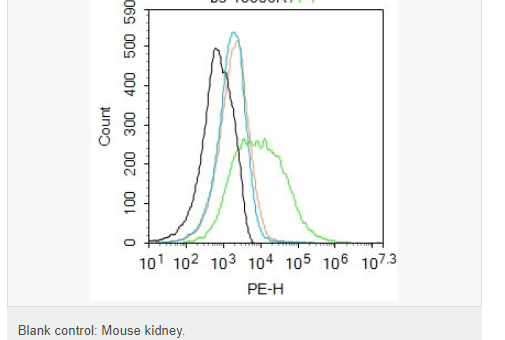

貨號(hào)
產(chǎn)品規(guī)格
售價(jià)
備注
BN40460R-100ul
100ul
¥2360.00
交叉反應(yīng):Human,Mouse(predicted:Rat) 推薦應(yīng)用:WB,IHC-P,IHC-F,ICC,IF,Flow-Cyt,ELISA
BN40460R-200ul
200ul
¥3490.00
交叉反應(yīng):Human,Mouse(predicted:Rat) 推薦應(yīng)用:WB,IHC-P,IHC-F,ICC,IF,Flow-Cyt,ELISA
產(chǎn)品描述
| 英文名稱 | TRPV6 |
| 中文名稱 | 鈣轉(zhuǎn)運(yùn)蛋白1抗體 |
| 別 名 | ABP/ZF; ABPZF; Alu binding protein with zinc finger domain; Calcium channel CaT1; Calcium transport protein 1; CaT L; CaT Like; CaT-L; CaT-like; CaT1; ecac; ECaC2; Epithelial apical membrane calcium transporter/channel CaT1; Epithelial calcium channel 2; Epithelial calcium channel; HSA277909; LP6728; MGC162545; NUDC; Transient receptor potential cation channel subfamily V member 6; TrpV6; TRPV6_HUMAN; ZFAB. |
| 研究領(lǐng)域 | 信號(hào)轉(zhuǎn)導(dǎo) |
| 抗體來(lái)源 | Rabbit |
| 克隆類型 | Polyclonal |
| 交叉反應(yīng) | Mouse, (predicted: Human, Rat, ) |
| 產(chǎn)品應(yīng)用 | WB=1:500-2000 ELISA=1:5000-10000 IHC-P=1:100-500 IHC-F=1:100-500 Flow-Cyt=3ug/Test ICC=1:100-500 IF=1:100-500 (石蠟切片需做抗原修復(fù)) not yet tested in other applications. optimal dilutions/concentrations should be determined by the end user. |
| 分 子 量 | 83kDa |
| 細(xì)胞定位 | 細(xì)胞膜 |
| 性 狀 | Liquid |
| 濃 度 | 1mg/ml |
| 免 疫 原 | KLH conjugated synthetic peptide derived from human TRPV6:4-100/725 |
| 亞 型 | IgG |
| 純化方法 | affinity purified by Protein A |
| 儲(chǔ) 存 液 | 0.01M TBS(pH7.4) with 1% BSA, 0.03% Proclin300 and 50% Glycerol. |
| 保存條件 | Shipped at 4℃. Store at -20 °C for one year. Avoid repeated freeze/thaw cycles. |
| PubMed | PubMed |
| 產(chǎn)品介紹 | This gene encodes a member of the vanilloid family of transient receptor potential (TRP) calcium channel proteins. Proteins in this TRP family have an N-terminal ankyrin repeat domain, which is required for channel assembly and regulation. [provided by RefSeq, Nov 2011]. Function: Calcium selective cation channel probably involved in Ca(2+) uptake in various tissues, including Ca(2+) reabsorption in intestine. The channel is activated by low internal calcium level, probably including intracellular calcium store depletion, and the current exhibits an inward rectification. Inactivation includes both, a rapid Ca(2+)-dependent and a slower Ca(2+)-calmodulin-dependent mechanism, the latter may be regulated by phosphorylation. In vitro, is slowly inhibited by Mg(2+) in a voltage-independent manner. Heteromeric assembly with TRPV5 seems to modify channel properties. TRPV5-TRPV6 heteromultimeric concatemers exhibit voltage-dependent gating (By similarity). Subunit: Homotetramer and probably heterotetramer with TRPV5. Interacts with TRPV5. Interacts with S100A10 and probably with the ANAX2-S100A10 heterotetramer. The interaction with S100A10 is required for the trafficking to the plasma membrane. Interacts with BSPRY (By similarity). Interacts with calmodulin. Subcellular Location: Cell membrane; Multi-pass membrane protein (By similarity). Tissue Specificity: Expressed at high levels in the gastrointestinal tract, including esophagus, stomach, duodenum, jejunum, ileum and colon, and in pancreas, placenta, prostate and salivary gland. Expressed at moderate levels in liver, kidney and testis. Expressed in locally advanced prostate cancer, metastatic and androgen-insensitive prostatic lesions but not detected in healthy prostate tissue and benign prostatic hyperplasia. Post-translational modifications: Glycosylated (By similarity). Phosphorylation at Tyr-161 by SRC leads to an increased calcium influx through the channel. Probably dephosphorylated at this site by PTPN1 (By similarity). Phosphorylation by PRKCA at the calmodulin binding site delays channel inactivation. Similarity: Belongs to the transient receptor (TC 1.A.4) family. TrpV subfamily. TRPV6 sub-subfamily. Contains 6 ANK repeats. SWISS: Q9H1D0 Gene ID: 55503 Database links: Entrez Gene: 55503 Human Entrez Gene: 64177 Mouse Omim: 606680 Human SwissProt: Q9H1D0 Human SwissProt: Q91WD2 Mouse Unigene: 302740 Human Unigene: 638966 Human Unigene: 296889 Mouse Unigene: 205943 Rat Important Note: This product as supplied is intended for research use only, not for use in human, therapeutic or diagnostic applications. |
